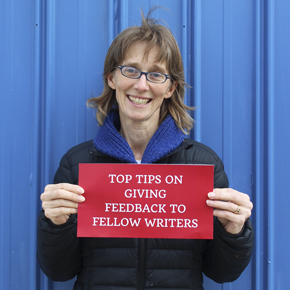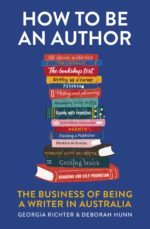Top tips on giving feedback to fellow writers

At their best, writing groups and workshops can be positive experiences that transform the largely solitary act of writing into a shared endeavour with like-minded people. They can give authors the opportunity to network with peers and to glean those vital first-reader impressions and opinions.
But sometimes sharing your work with an audience for the first time can be a challenging experience. Developing a sense of trust amongst fellow writers is essential, so, in the spirit of ‘do unto others’, it helps to give some thought to how best to critique one another’s work. In this post, we’ve asked publisher Georgia Richter to provide some tips on the kinds of feedback authors might find useful. There’s also a handy downloadable guide.
- As a former writer, creative writing teacher, and now, editor, I have experienced the process of workshopping writing from all possible angles. As an editor, my role is to provide responses to authors that are helpful and constructive. My role is to understand and uphold the author’s voice and their intention. I need to be able to ask the right question at the right time, and to provide an intelligent reader’s response to a work that will enable the author to see their piece with fresh eyes. My job is not to tell the author how they should write their piece, or how they should resolve a knotty problem.
- When reviewing someone’s work, it is important to remember that the piece before you is a work in progress. It can be helpful if the author can tell you how far advanced the draft is, and whether there is anything in particular they would like you to pay attention to.
- Remember to base your responses on the text before you. Wearing an editor’s hat can be a deeply satisfying experience as you join the writer in their endeavour to make their work as strong as it can possibly be. In approaching someone else’s writing as an editor, you will also gain skills when it comes to revising your own work. Ideally, your comments will encourage authors to look at their work from a new angle and will give them the energy and desire to take it to the next stage.
- Before providing feedback, ask yourself: what do you find most useful when you’re receiving a critique of your work? And how do you like to receive that information? Wherever possible, try to serve up your comments in a friendly sandwich: something positive; something that can be improved; something positive again.
- You might begin by seeing if you can answer some of the questions below:
- What is the voice of the piece and its tone?
- What is the author’s intention? Is it being realised?
- What is working?
- Is anything missing?
- Is it clear who is speaking?
- Is the pace too fast or too slow?
- Can you tell what is happening, in terms of plot?
- What are the rules of the world the author has created, and do they hold up? Or are they deliberately being broken?
- Is there consistency in idiom, tense, point of view?
- Is the structure of the work clear?
- Are there any anachronisms or issues of authenticity?
- As you prepare your responses, you might shape them around comments on the work’s plot, structure, narrative voice, characterisation, dialogue, pace, scene setting, language use, tense and consistency.
- As part of a broader conversation, it can also be useful for authors to know what genre you think the work is, what kind of reader you think would enjoy the book, which section of the bookshop it might sit in and whether it reminds you of other books on the market.
For more information about WA writing groups visit writingWA.
Our complete ‘Tips for workshopping an author’s work’ can be downloaded here.



